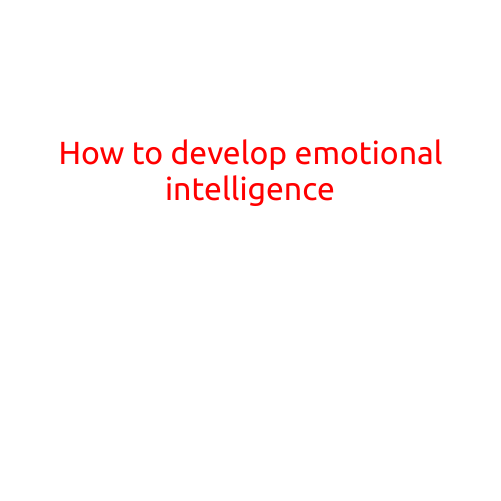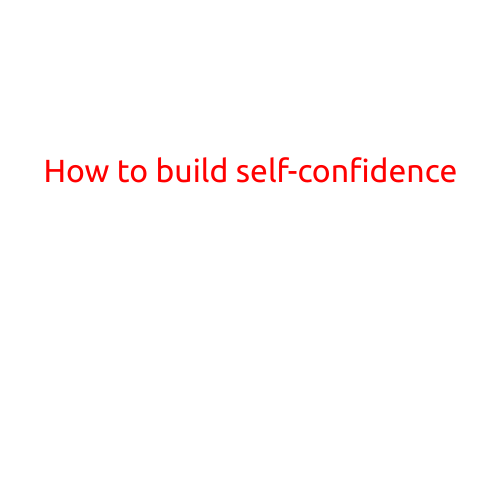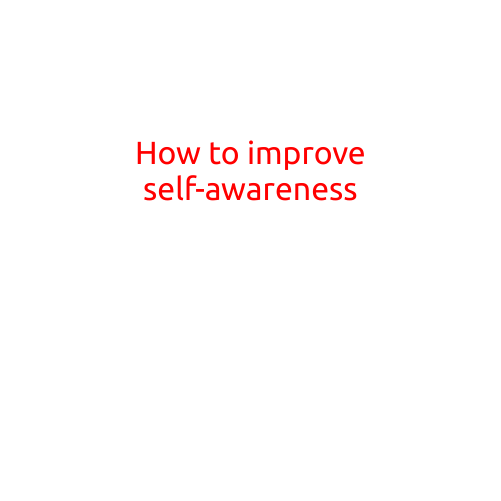
How to Develop Emotional Intelligence
Emotional intelligence (EI) is the ability to recognize and understand emotions in yourself and others, and to use this awareness to guide your thoughts and actions. It’s a skill that can be developed through practice, self-awareness, and a willingness to learn. In this article, we’ll explore how to develop emotional intelligence and why it’s important for personal and professional growth.
Why Develop Emotional Intelligence?
Emotional intelligence is essential in today’s fast-paced and often stressful world. It can help you:
- Build stronger relationships with family, friends, and colleagues
- Communicate more effectively and avoid misunderstandings
- Manage stress and conflict more effectively
- Make better decisions and solve problems more effectively
- Improve your overall well-being and mental health
Step 1: Self-Awareness
The first step in developing emotional intelligence is to become more self-aware. This means understanding your own emotions, strengths, and weaknesses. Take time to reflect on your emotions and how they affect your behavior and relationships. Ask yourself:
- What are my emotional triggers?
- How do I handle stress and conflict?
- What are my values and what drives me?
- What are my strengths and weaknesses?
Step 2: Recognize and Identify Emotions
The next step is to recognize and identify emotions in yourself and others. Practice mindfulness and pay attention to your physical sensations, thoughts, and emotions. Ask yourself:
- What am I feeling right now?
- How am I feeling in this situation?
- Can I recognize the emotions of others and respond appropriately?
Step 3: Empathy and Understanding
Empathy is the ability to understand and share the feelings of others. Practice active listening and try to see things from another person’s perspective. Ask yourself:
- How would I feel if I were in their shoes?
- What are their needs and concerns?
- How can I show empathy and understanding?
Step 4: Regulation of Emotions
The ability to regulate your emotions is crucial in developing emotional intelligence. Practice relaxation techniques such as deep breathing, meditation, and yoga to reduce stress and anxiety.
- How can I manage my emotions in a healthy way?
- What are my coping mechanisms for stress and conflict?
- How can I prioritize self-care and relaxation?
Step 5: Effective Communication
Effective communication is key in building strong relationships and managing conflict. Practice active listening, clear and assertive communication, and empathy. Ask yourself:
- How can I communicate more effectively?
- What are the key points I want to convey?
- How can I show empathy and understanding in my communication?
Step 6: Practice and Feedback
Developing emotional intelligence takes practice, so try to practice these skills regularly. Ask for feedback from others on how you’re doing and be open to constructive criticism. Ask yourself:
- How can I improve my emotional intelligence?
- What am I doing well?
- What areas do I need to work on?
Conclusion
Developing emotional intelligence is a journey that requires self-awareness, practice, and a willingness to learn. By following these steps, you can improve your emotional intelligence and enhance your personal and professional relationships. Remember that emotional intelligence is a skill that can be developed over time with practice and patience.





